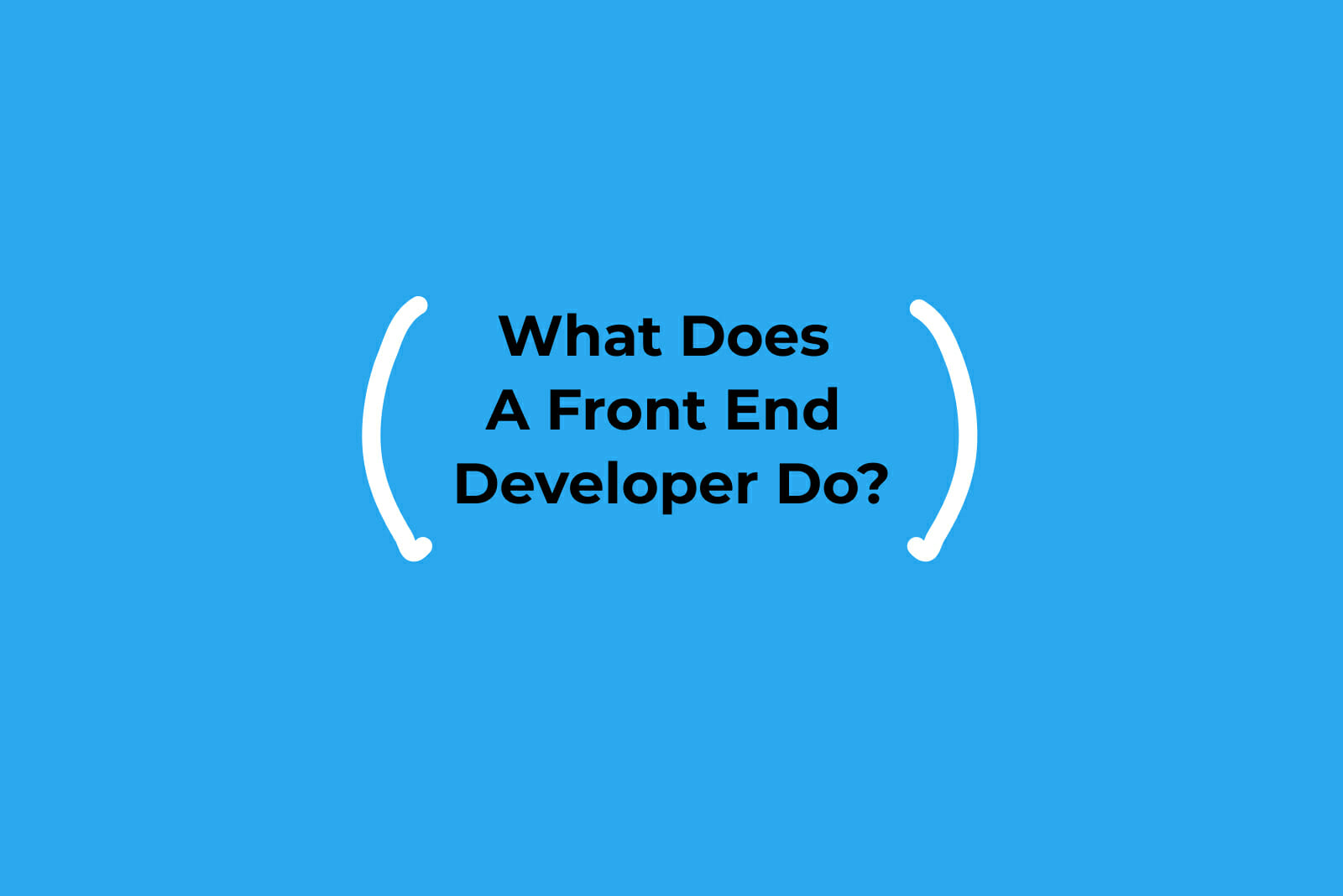What is a Web Developer?
Web development is one of the core roles in the tech industry. So what exactly is it? What skills does a web developer need? And what is the difference between front end, back end, and full stack web developers? This guide explains it all.

Let’s be real for a minute: One of tech’s biggest downsides (yes, there ARE some) is its perceived barrier to entry.
The keyword there is: “perceived.”
No, you don’t need a college degree to start learning to code, you don’t need to have PhD level math skills to build a website, and you don’t even need a background with computers or technology to dive into tech basics.
But let’s stay on this theme of being real—the industry itself doesn’t exactly do the best job of dispelling those perceptions.
One look at tech’s arcane job titles is enough to make a lot of newcomers go running the other way. But good news! You don’t have to run anywhere. We’re here to help, and we’re going to start by demystifying one of the most flexible and savvy roles beginners can leverage when breaking into the tech industry…the web developer.
Table of Contents

What is a Web Developer?
If you’ve gone down even the shallowest Google rabbit hole regarding tech jobs, you’ve seen this title. And if you’ve dug just a little further you’ve probably also seen titles like “front end developer,” “back end developer,” and “full stack developer” (all without a lot of clarity as to what they actually MEAN).
So what IS a web developer? Are all those other roles related? And how does any of this relate to YOU transitioning to a career in tech? Let’s start with the basics.
Web Developer: A Definition
Web developers use coding languages (think HTML, CSS, JavaScript, and Python) to build websites and web applications.
It’s really as simple as that. Developers take the visions and plans created by web designers (a separate, but related role) and use code to turn those designs into what you see on your phone, tablet, or computer screen. Since web development is THE cornerstone of all things tech (no websites, no mobile apps, no internet), you can see why this role is in high demand (and how knowing web developer skills will make you infinitely hirable).
Meanwhile, it’s precisely that demand that makes web development a flexible entry point for tech newbies. Everyone needs a functional website (from your friend’s food truck to Facebook and Google) and that means there’s plenty of work to go around for web developers of all skill and experience levels.
You can start off with the absolute basics (skills like HTML and CSS) and do paid jobs for friends and family, you can level up your skills with intermediate and advanced languages like JavaScript and Python and work at the highest levels of Big Tech, or you can land at any point in between. And THAT’s the beauty of breaking into tech as a web developer.
Sold? Great! But now what? Well, next it’s important to note that—underneath the tent of “web development”—there are some specific developer categories. The big three include:
- Front end web developers
- Back and web developers
- Full stack web developers
If you’re interested in learning more about becoming a web developer you’ll need to learn what kind of jobs are associated with each category, what skills they require, and who each of these roles is best suited for. Aaaand, you guessed it, That’s exactly what we’re covering next.
Front End Web Developers
What is a Front End Web Developer?
Front end web developers use languages like HTML, CSS, and JavaScript to build the visible parts of websites or mobile apps (think “front-facing”). These are the menus, pages, and forms you see on a screen through your web browser. And—while there doesn’t need to be anything entry level about front end development in the long term (plenty of developers spend their entire career doing front end web development)—it is without a doubt THE best starting point for beginning web developers.
Every single website needs a front end, bringing us back to the idea that front end web developers can jump into smaller freelance jobs with basic skills as they build toward more complicated jobs and higher profile clients.
Who Should Be a Front End Developer?
OK, this one’s easy. As we mentioned, front end web development is THE place to start if you’re new to tech. So…pretty much everybody! Why?
Because you can learn the most basic skills needed for front end development in a matter of months, and then leverage those skills into paid work. But front end development will also give you room to grow. After you learn the basics, there are plenty of additional skills you can add to your repertoire that will make you even more hirable and let you take on bigger and higher paying jobs.
What Are Front End Web Developer Skills?
You can read even more about front end web developer skills here, but the most fundamental skills are front end coding languages. These include:
- HTML—HTML is a markup language used to format and arrange web pages
- CSS—CSS is HTML’s sister language, used to add style (colors, fonts, etc.) to those formatted web pages
- JavaScript—JavaScript is a scripting language used to create and control dynamic webpage and mobile app content. In other words, anything that animates or refreshes on screen without the user manually reloading the page (things like interactive forms, animated menus, autocomplete features, etc).
In addition to these core skills, it also helps to familiarize yourself with JavaScript libraries (collections of pre-written JavaScript code that are used to streamline the coding process) including:
These languages and libraries, along with various best QA, project tracking, and bug testing practices, are the foundation of front end web development. You can learn more about all of these skills (and even get hands on!) through our free 10 day coding camp. And when you’re ready to get really serious, you can check out our Skillcrush Front End Developer Course, an online instructor-led class designed to be completed in just three months by spending an hour a day on the materials.
Front End Developer Jobs and Salaries
Sooo, now that you know what a front end web developer actually does, you might also be wondering how much the job pays. According to Indeed, entry level front end web developers make an average of $54,492 a year, with mid-level positions bringing in an average $100,245 per year. And get this: as of this writing, Indeed has a whopping 20,000+ open front end positions listed. No time like the present to land your own!

Back End Web Developers
What is a Back End Web Developer?
Ok, if front end developers build the visible parts of websites and apps, back end web developers do the opposite—they’re responsible for building and maintaining the “under the hood” infrastructure that allows websites and mobile apps to function. What does that infrastructure look like, you ask? It includes things like:
- Databases—applications that store the data websites use for dynamic updates (e.g. when a banking website provides you with real time account information)
- Server scripts—coding instructions that allow a website or app to communicate with and retrieve data from external servers and databases
- APIs (Application Programming Interfaces)—sets of routines, protocols, and tools that let applications communicate across platforms (when you share an article from a blog to Facebook or Twitter using a “share” button, it’s an API that makes the magic happen).
Because the average mom and pop website really only needs to worry about their front end (the back end is usually managed through a hosting service), back end development has fewer opportunities for entry level freelance work. Back end development is generally the domain of programmers working for larger companies.
Who Should Be a Back End Developer?
While there are always exceptions, in most cases it’s best to pursue back end development if you’ve already been around the tech block a few times. Because of the specialized nature of the work, it’s harder to get a foothold when you’re just starting to build your skills. That said, once you’ve learned the front end basics and you’re ready for a new challenge, there’s no reason you shouldn’t learn some back end skills. A well rounded resume never hurts, and you might find that back end is actually your thing.
What Are Back End Web Developer Skills?
Just like front end web development, back end development has its own set of coding languages that make up the core of back end skills. These include:
- Python—a popular and easy to use programming language used for back end scripting
- PHP—a back end scripting language commonly used for requesting server content
- Ruby on Rails—a web framework for the Ruby programming language, allowing it to be used for building back end infrastructure
- SQL—an industry standard coding language used for managing databases
In addition to these languages, it’s important for back end developers to be familiar with REST (Representational State Transfer) and SOAP (Simple Object Access Protocol). These are two examples of what devs like to call “API architectures”—in other words, platforms used for building and managing APIs. You can read a whoooole lot more about these two Platforms in this Upwork article, but the takeaway here is that you’ll need to familiarize yourself with them if you decide to get really serious about back end web development.
Back End Developer Jobs and Salaries
As you might guess, back end web development’s steeper learning curve and higher barrier to entry also means the jobs pay a bit more than what you’ll see with front end developer roles. Of the almost 6,000 open back end developer jobs currently posted on Indeed, the average going salary for intermediate back end developers is $124,272 per year, with senior positions making $149,975.
If you feel like you’re ready to learn back end web developer skills but aren’t sure where to start, consider our Skillcrush Web Developer Course. This online class is designed to be completed in just three months by spending an hour a day on the materials. And don’t forget to check back in during Fall of 2019 for the launch of our brand new Python course!
Full Stack Web Developers
What is a Full Stack Web Developer?
Now that you know the difference between a front end web developer and a back end web developer, it’s pretty easy to understand what a full stack web developer is.
Full stack developers are simply web developers with a full complement of front end AND back end skills (they’re the quintessential “unicorn” candidates you may have heard dev types talk about). Due to being versed in both sides of the development process, full stack developers can theoretically contribute anywhere as needed on a development team. In fact, some big tech companies like Facebook have a reputation for actively seeking out full stack developers with the idea that they make for the most versatile job candidates (the term “full stack developer” was canonized in a 2010 post by Facebook engineer Carlos Bueno).
Who Should Be a Full Stack Developer?
Sooo, does the above mean that full stack web development should be the ultimate aim of all web developers? Eh, not really. If you DO want to work for a major tech company like Facebook, then sure, fleshing out as many front end AND back end skills as you can is one of the most direct ways to get there. But the great thing about tech is that it’s not one size fits all. If you want to work in big tech then by all means, follow your dream, but if you want the flexibility that comes with doing freelance front end work, that option is all yours, too. It’s completely up to what kind of work appeals to YOU.
Full Stack Web Developer Jobs and Salaries
Right now, Indeed lists nearly 16,000 open full stack web developer jobs at an average of $109,728 per year.





